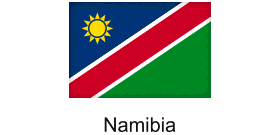 Namibia Streamlines Visa Processes, Creating New Opportunities for African Travel Trade
Namibia Streamlines Visa Processes, Creating New Opportunities for African Travel Trade
Namibia has unveiled a revamped visa system, effective April 1st, 2025, designed to simplify travel and boost tourism. These changes offer exciting new prospects for African travel agents specializing in Namibian destinations.
A key highlight of the new system is the introduction of visa exemptions for diplomatic passport holders from Germany and France, as well as for diplomatic and official passport holders from Switzerland. This move is expected to facilitate smoother diplomatic relations and potentially increase business travel between Namibia and these European nations. Travel professionals can leverage these changes to promote Namibia as a destination for high-level delegations and business ventures.
Recognizing the growing importance of cruise tourism, Namibia has introduced a day visit fee of N\$300.00 for passengers disembarking at Walvis Bay and Lüderitz Harbours. This targeted fee aims to capitalize on the increasing number of cruise ships docking at these ports, generating additional revenue for the tourism sector. For travel agents, this presents an opportunity to create specialized packages that cater to cruise passengers, incorporating pre- or post-cruise excursions and land-based experiences in Namibia.
The new visa regime also introduces a standardized fee structure for various visa categories. Travelers from African Union (AU) countries will pay N\$1,200.00 for holiday visas, short-term employment permits, and visa-on-arrival requests, while travelers from non-AU countries will pay N\$1,600.00. A discounted fee structure is in place for minor children: N\$600.00 for those aged 6-11 from AU countries and N\$800.00 for the same age group from non-AU countries. Children under six continue to be exempt from visa fees. This clear and consistent pricing structure simplifies the visa application process for travel agents and their clients.
Perhaps the most innovative aspect of Namibia’s updated visa system is the introduction of group bulk payments for online e-visa transactions. This allows service providers to process payments of up to N\$97,000 in a single transaction, significantly streamlining the process for tour operators and travel agents handling large groups. This feature is particularly beneficial for managing complex itineraries and multiple visa applications simultaneously, saving valuable time and resources.
To illustrate the practical implications of these changes, consider a hypothetical scenario: a tour operator organizing a trip for a group of 15 adults from a non-AU country. Under the new system, the operator can process a single bulk payment of N\$24,000 (15 adults x N\$1,600.00), rather than handling 15 individual transactions. This not only simplifies accounting but also reduces the risk of errors and delays.
Namibia’s updated visa regime is a strategic move to enhance the country’s appeal as a tourist destination. By streamlining processes, offering convenient payment options, and capitalizing on the growth of cruise tourism, Namibia is creating a more welcoming environment for international visitors. African travel agents are well-positioned to leverage these changes, offering seamless travel experiences to their clients and contributing to the growth of Namibia’s tourism sector.
The simplified fee structure, coupled with the bulk payment option, empowers travel agents to manage visa applications more efficiently, allowing them to focus on crafting exceptional travel experiences for their clients. As Namibia continues to invest in its tourism infrastructure and streamline its administrative processes, the country is poised to become an even more attractive destination for travelers from across the globe.
These visa reforms are a clear signal that Namibia is open for business and ready to welcome the world. For African travel professionals, this presents a golden opportunity to expand their offerings, attract new clients, and contribute to the continued growth of tourism in Namibia and the wider African region.
